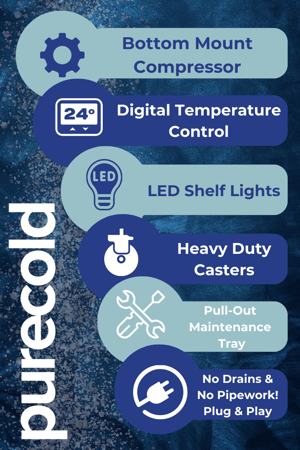Why Supermarkets Should Switch to Self-Contained Refrigeration and Freezer Units
In the world of food retail, refrigeration and freezer units are essential for preserving perishable items. Traditionally, supermarkets have used remote refrigeration and freezer units, which are located outside the store and connected to the store's cooling system through pipes. However, there is a growing trend towards self-contained refrigeration and freezer units, which are located inside the store and have their own cooling systems. In this blog post, we will explore some of the benefits of switching to self-contained refrigeration and freezer units and what benefits each option provides.
Benefits of Self-Contained Refrigeration and Freezer Units
Energy Efficiency
One of the main benefits of self-contained refrigeration and freezer units is their energy efficiency. Since these units have their own cooling systems, they do not require as much energy to operate as remote units. This can result in significant cost savings as well as a reduced carbon footprint.
Flexibility
Self-contained refrigeration and freezer units also offer greater flexibility than remote units. Since they are located inside the store, they can be easily moved or rearranged as needed. This allows supermarkets to optimize their use of space and create more attractive displays for customers.
Reduced Maintenance Costs
Another advantage of self-contained refrigeration and freezer units is that they require less maintenance than remote units. Since they are self-contained, there are no pipes or other components that need to be regularly inspected or repaired. This can result in lower maintenance costs for supermarkets.
Benefits of Remote Refrigeration and Freezer Units
Lower Noise Levels
One of the main benefits of remote refrigeration and freezer units is that they produce less noise than self-contained units. Since the compressor and other components are located outside the store, customers are less likely to be disturbed by the noise.
Greater Storage Capacity
Remote refrigeration and freezer units also offer greater storage capacity than self-contained units. Since they are located outside the store, they can be larger and hold more items. This can be an advantage for supermarkets that need to store large quantities of perishable items.
Lower Heat Output
Finally, remote refrigeration and freezer units produce less heat than self-contained units. Since the compressor and other components are located outside the store, they do not contribute to the store's overall heat load. This can result in lower cooling costs in the warmer months.
Conclusion
While both self-contained and remote refrigeration and freezer units have their advantages, there is a growing trend towards self-contained units in the food retail industry. These units offer greater energy efficiency, flexibility, and reduced maintenance costs, making them an attractive option for supermarkets, grocery stores, gas stations and convenience stores.